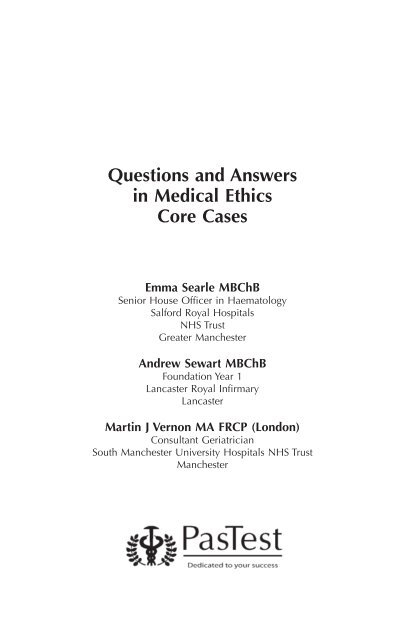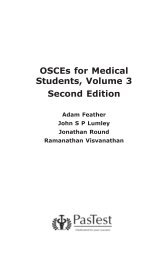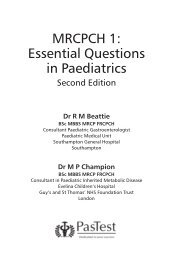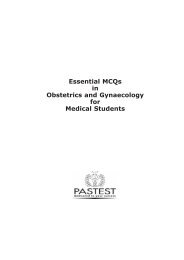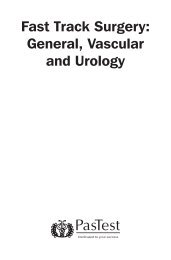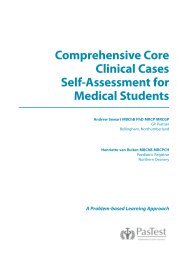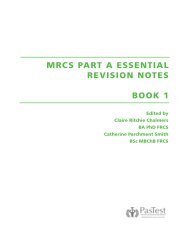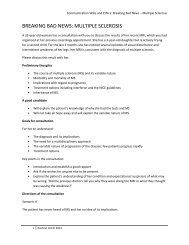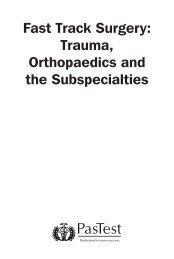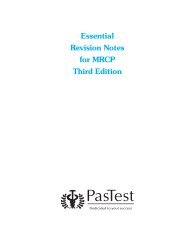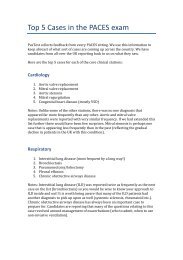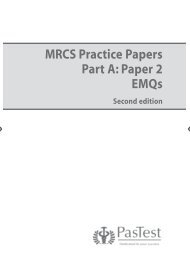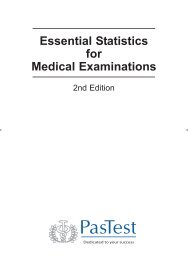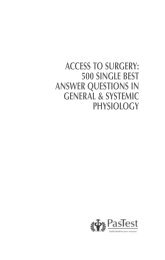Questions and Answers in Medical Ethics Core Cases - PasTest
Questions and Answers in Medical Ethics Core Cases - PasTest
Questions and Answers in Medical Ethics Core Cases - PasTest
- No tags were found...
You also want an ePaper? Increase the reach of your titles
YUMPU automatically turns print PDFs into web optimized ePapers that Google loves.
<strong>Questions</strong> <strong>and</strong> <strong>Answers</strong><strong>in</strong> <strong>Medical</strong> <strong>Ethics</strong><strong>Core</strong> <strong>Cases</strong>Emma Searle MBChBSenior House Officer <strong>in</strong> HaematologySalford Royal HospitalsNHS TrustGreater ManchesterAndrew Sewart MBChBFoundation Year 1Lancaster Royal InfirmaryLancasterMart<strong>in</strong> J Vernon MA FRCP (London)Consultant GeriatricianSouth Manchester University Hospitals NHS TrustManchester
CONTENTSpageForewordIntroductionivv<strong>Questions</strong>Scenario 1: Advance directives 1Scenario 2: Consent <strong>in</strong> m<strong>in</strong>ors 7Scenario 3: Euthanasia <strong>and</strong> assisted dy<strong>in</strong>g 13Scenario 4: Antenatal screen<strong>in</strong>g <strong>and</strong> abortion 19Scenario 5: Withhold<strong>in</strong>g <strong>and</strong> withdraw<strong>in</strong>g treatment 25Scenario 6: Consent <strong>in</strong> adults 31Scenario 7: Organ donation 37Scenario 8: Confidentiality 43<strong>Answers</strong>Scenario 1: Advance directives 49Scenario 2: Consent <strong>in</strong> m<strong>in</strong>ors 61Scenario 3: Euthanasia <strong>and</strong> assisted dy<strong>in</strong>g 73Scenario 4: Antenatal screen<strong>in</strong>g <strong>and</strong> abortion 91Scenario 5: Withhold<strong>in</strong>g <strong>and</strong> withdraw<strong>in</strong>g treatment 105Scenario 6: Consent <strong>in</strong> adults 119Scenario 7: Organ donation 137Scenario 8: Confidentiality 153Index 167
SCENARIO 1:ADVANCE DIRECTIVESQUESTIONS
SCENARIO 1:ADVANCEDIRECTIVESAdvance DirectivesTom, a lifelong smoker with end-stage respiratorydisease, is brought <strong>in</strong>to A&E with extreme dyspnoea.From his past medical history he is considered at highrisk of cardiopulmonary arrest. He <strong>in</strong>forms you as theadmitt<strong>in</strong>g doctor that he has made an advance directive.Give 2 forms which his advance directive may take.2 marks1.2.Tom h<strong>and</strong>s you his advance directive, which states thatshould he arrest he does not want to be resuscitated.List 4 of your responsibilities regard<strong>in</strong>g Tom’s advancedirective.4 marks1.2.3.4.3
<strong>Core</strong> Cl<strong>in</strong>ical <strong>Cases</strong>: <strong>Questions</strong> <strong>and</strong> <strong>Answers</strong> <strong>in</strong> <strong>Medical</strong> <strong>Ethics</strong>Advance DirectivesName 2 wishes that advance directives cannot request.1.2.Give 2 advantages <strong>and</strong> 2 disadvantages of an advancedirective.4 marks4 marksAdvantages:1.2.Disadvantages:1.2.Tom’s wife is <strong>in</strong>formed of the DNR order made on thebasis of his valid advance directive. She is unhappy withthis treatment decision <strong>and</strong> asks you to perform CPR ifher husb<strong>and</strong> arrests.Name 2 of his human rights that would be broken if CPR wereperformed (with a short explanation).4 marks1.2.4
Scenario 1 <strong>Questions</strong>Give 2 other situations when CPR should not be attempted.1.2.In the absence of an advance directive, who typically has thef<strong>in</strong>al say on whether an <strong>in</strong>capacitated patient should undergoCPR?1 mark1 markAdvance Directives1.Total: 20 marksANSWERSPAGES 49–605
SCENARIO 2:CONSENT IN MINORSQUESTIONS
SCENARIO 2:CONSENTIN MINORSAndy, a 14-year-old schoolboy, is <strong>in</strong>volved <strong>in</strong> a roadtraffic accident. On arrival at A&E he is alert, has aclosed fracture of his humerus, <strong>and</strong> is compla<strong>in</strong><strong>in</strong>g ofabdom<strong>in</strong>al pa<strong>in</strong>. His BP is noted to be dropp<strong>in</strong>g <strong>and</strong> anabdom<strong>in</strong>al scan is suggestive of a ruptured spleen. Youadvise him that he will need a blood transfusion <strong>and</strong> anemergency operation.Consent <strong>in</strong> M<strong>in</strong>orsAt what age is a m<strong>in</strong>or presumed to be competent to giveconsent for treatment? Which statute specifies this <strong>in</strong> Engl<strong>and</strong> <strong>and</strong>Wales?2 marks1.2.List one similarity <strong>and</strong> one difference between consent under thisstatute <strong>and</strong> consent <strong>in</strong> adults?2 marksSimilarity:1.Difference:1.9
<strong>Core</strong> Cl<strong>in</strong>ical <strong>Cases</strong>: <strong>Questions</strong> <strong>and</strong> <strong>Answers</strong> <strong>in</strong> <strong>Medical</strong> <strong>Ethics</strong>You assess Andy to determ<strong>in</strong>e whether he is competentto consent to the blood transfusion <strong>and</strong> emergencyoperation.Consent <strong>in</strong> M<strong>in</strong>orsIn Andy’s case which common law test should be used to determ<strong>in</strong>eif he is competent to give consent to treatment?1 mark1.Expla<strong>in</strong> the 2 factors considered <strong>in</strong> this test.2 marks1.2.You deem Andy to be competent <strong>and</strong> he consents to theproposed treatment.Give 4 examples of people/agencies with parental responsibility whocan consent to treatment on behalf of a child who is notcompetent.4 marks1.2.3.4.10
Scenario 2 <strong>Questions</strong>As Andy is be<strong>in</strong>g prepared for surgery his parents arrive<strong>and</strong> are <strong>in</strong>formed of events. They <strong>in</strong>struct you that theydo not want Andy to receive blood products on religiousgrounds, refus<strong>in</strong>g to consent to the blood transfusion.Give 2 examples of when parental consent may not be valid. 2 marks1.2.Consent <strong>in</strong> M<strong>in</strong>orsUnder pressure from his parents, Andy is dissuaded fromconsent<strong>in</strong>g to the blood transfusion.List 2 examples of people/agencies who might overrule refusal oftreatment by a competent m<strong>in</strong>or.2 marks1.2.List 2 examples of situations <strong>in</strong> which doctors may proceed withemergency treatment considered to be <strong>in</strong> the child’s best <strong>in</strong>terestswithout consent.2 marks1.2.11
<strong>Core</strong> Cl<strong>in</strong>ical <strong>Cases</strong>: <strong>Questions</strong> <strong>and</strong> <strong>Answers</strong> <strong>in</strong> <strong>Medical</strong> <strong>Ethics</strong>Do you have a legal responsibility to <strong>in</strong>form Andy’s parents if hedecides to have the blood transfusion aga<strong>in</strong>st their wishes? 1 mark1.Consent <strong>in</strong> M<strong>in</strong>orsTotal: 18 marks12ANSWERSPAGES 61–72
SCENARIO 3:EUTHANASIA ANDASSISTED DYINGQUESTIONS


